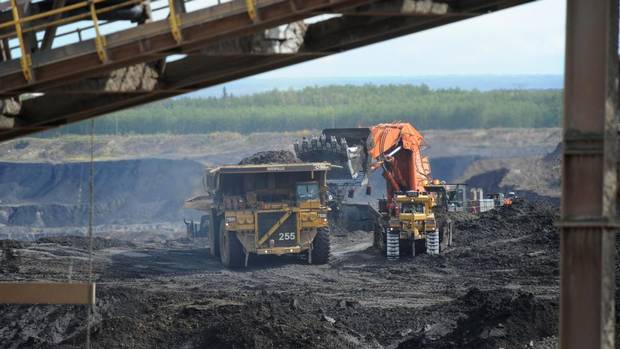This article is part of a year-long Globe project about Fort McMurray, Alta., which has come to be the emblem of Canada’s energy sector, and all the issues that surround it.
Debbie March calls it, affectionately, Fort McMurray’s Newfie restaurant – Ms. B’s, popular among the Newfoundland and Labrador diaspora who came to Alberta for work as the oil sands boomed. She is one of them, and the manager.
Lately, things have not quite been the same here as the price of oil has continued to slide. Ms. B’s is among many local businesses where sales have fallen off.
“It’s like the place has gone dead,” Ms. March says of Fort McMurray. At the downtown restaurant, she is sending servers home early, amid empty tables. “…The past couple of weeks, I’ve never seen it this bad here at the restaurant.”
The falling oil price triggered layoffs last week at Shell, and on Monday, cuts in forecast capital spending and production growth at another oil producer, Canadian Natural Resources Ltd. (CNRL). Local retailers report slumping sales, charter plane traffic is down, and last month, two residential work camps closed. The price drop was on the agenda as the Chamber of Commerce board met late Monday, a day the price of oil plunged another 5 per cent.
However, business and labour leaders are preaching caution, saying Fort McMurray has been through dips before – and that it is too soon to know what the impact of sub-$50 oil will be.
Stores across Fort McMurray say they have noticed a slide. At Mark’s Work Wearhouse, sales of heavy-duty boots and other gear have fallen off since about October, manager Derek Estabrooks says. “There’s no new hires, that’s our biggest problem,” he said. “…Our business thrives on that.”
There have been early indications of cutbacks and cancelled projects in the oil sands, but the impact here is expected to be two-tiered – temporary construction, contracting and fly-in jobs affected first, as opposed to salaried jobs based in Fort McMurray. Many here see contractor and construction cuts as a bellwether, but the picture is murky. Layoffs over the holidays are routine in construction jobs, with call-backs in January. In weighing the impact of $50 oil, Fort McMurray is still waiting to see if those construction workers, and hospitality and other staff that support them, come back this month.
“It’s bad timing, because we don’t know if it’s oil [prices] or Christmas layoff. We do have a number of job orders on the board to send people back to work,” said Ian Robb, president of Unite Here Local 47, a union representing food and hospitality workers at work camps around Fort McMurray. He is not panicking. “I have confidence the industry will pick up again. We look at it this way – yep, another hiccup in the Fort McMurray drama.”
Last week, word spread of about 200 layoffs at Shell’s Albian Sands mine, one of the major producers. The move affected less than 10 per cent of the Albian work force, and the company remains on solid footing, even with the price of oil at about $50. Canadian synthetic crude production costs about $38 per barrel, according to its 2013 annual report.
However, some saw the Shell move as significant because it went beyond contractor and construction jobs.
“That’s kind of spread the rumours around there could be more layoffs,” says Ken Smith, president of Unifor Local 707-A, representing workers at another major mine, Suncor, which has not announced layoffs. “…It’s been a long time since we’ve seen layoffs at the major plants, like Shell.”
On Monday, CNRL – citing commodity prices – trimmed its projected capital spending this year to $6.2-billion, down from $8.6-billion. The company said its oil production is still set to increase seven per cent this year, although it had originally estimated 11 per cent growth.
The Bank of Canada’s latest business outlook survey, published on Monday, found the outlook for companies “linked directly or indirectly to the energy sector has deteriorated,” and that firms in the Prairies or linked to energy now “anticipate a moderation in the pace of sales growth in the wake of falling oil prices.”
Businesses are looking for ways to be more efficient, but say the current drop feels like the price decline of 2008, Chamber president Nick Sanders said in an interview after Monday’s meeting.
“They’re feeling it’s very similar [to 2008], they’re thinking maybe it could potentially hang around a little bit longer,” he said. Some businesses have noticed people are buying “needs, not wants,” he said, but Christmas sales were solid and businesses are hesitant to scale back or lay off in case the price rebounds. “It’s about becoming more effective, right-sizing [a company] and making sure you still have the right skill-set sitting around the table when things turn around,” he said.
Other early signs hint at stagnation rather than decline. The Fort McMurray airport had a banner year last year and traffic has surged. The latest figures, however, show November traffic was flat compared to November, 2013, while the number of people travelling on charter flights, often hired by major companies, dropped 23 per cent from the previous November. Charter flight traffic at Fort McMurray’s airport has dropped, from the previous year, in four of the past six months.
The municipality has used utility consumption in the past to figure out how many people live in Fort McMurray, including the “shadow population” of short-term workers. The municipality was unable to provide recent water-use figures. One power provider, Direct Energy, says consumption last month in Fort McMurray was down 13 per cent from December, 2013, but stressed weather was a major factor and commercial power use is relatively unchanged. The Alberta Electric System Operator said average power demand in Fort McMurray for November, the most recent data available, was up 10.6 per cent from the previous November.
There have also been closings – two camps for workers owned by Civeo Corp., which said the move came amid cuts in oil companies’ capital spending. Mr. Robb of the union representing hospitality workers said it was more related to failed lease negotiations and one of the two lodges being outdated. “The price of oil really didn’t affect those two closures,” Mr. Robb argued. “…Everybody will be doing this blame game, [saying] ‘it’s all on the price of oil.’ Some will be.”
Nonetheless, many say things seem slower this month. On Franklin Avenue, Fort McMurray’s main drag downtown, entrepreneur Pius Poitras owns Chow’s Varieties, selling lottery tickets, fishing and hunting supplies and other goods. He noticed business drop, in particular at his second location in a more residential part of town.
“It’s hard to pinpoint exactly what it is, but sales overall are down,” he said. That’s a problem in a community where the boom has sent wages and lease rates soaring, a challenge for business owners. He hopes one day to sell and retire with his wife, but keeps an eye on the oil price. “I watch it every day,” he said. “More for curiosity than anything else.”
JOSH WINGROVE
FORT MCMURRAY, ALTA. — The Globe and Mail
Published Monday, Jan. 12 2015, 9:20 PM EST
Last updated Tuesday, Jan. 13 2015, 10:00 AM EST


